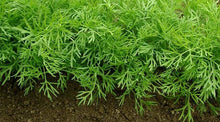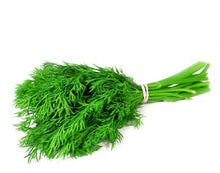100 seeds
Ready in 70 days
Planting companions: Broccoli, carrot, cabbage, Brussels sprouts, cauliflower, cucumber, pickle, turnip, ...
Unsuitable companion: Fennel, parsnip, parsley, ...
Dill is valued by butterflies, bees, and birds.
Its scent repels some undesirable insects such as carrot fly, aphids, red spiders, and leek moth.
Dill does not tolerate transplantation well. Direct sowing in the garden is preferred. When all risk of frost is eliminated, sow dill seeds in rich, moist, and well-drained soil. Sow them at a depth of 1/4'' while taking care to cover the seeds well. Mulch them to control weeds and help retain soil moisture. Mature plants can bolt if the soil is too dry, so make sure the soil remains consistently moist, and provide them with a location sheltered from strong winds.
As soon as the leaves reach a sufficient size, you can harvest them. Fresh leaves, which have a better taste, can be stored for up to 2 days in the refrigerator. They can also be dried and frozen.




